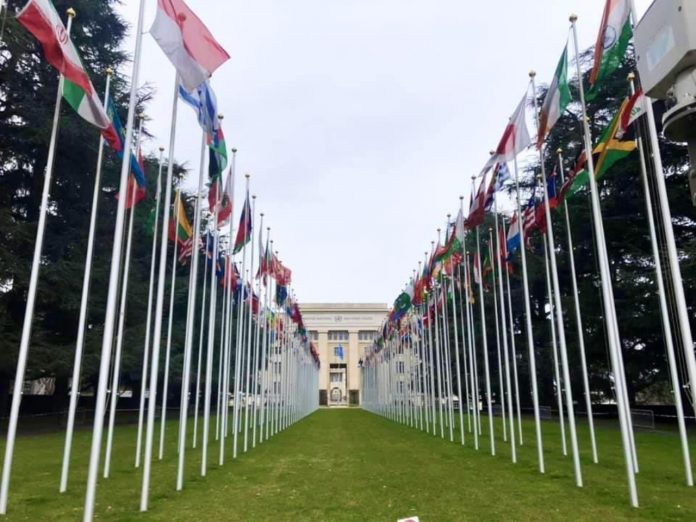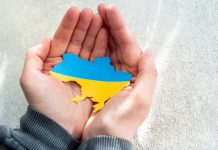Working on human rights and disarmament for the World Council of Churches (WCC) does not show instant results. The quest needs perseverance, says the WCC programme executive who interacts with the United Nations in Geneva. Jennifer Philpot-Nissen, a trained human rights lawyer, has the task of engaging on human rights and disarmament for the WCC’s Commission of the Churches on International Affairs.
“Advocacy is not an overnight thing; advocacy can be 10 years or even 50 years,” said Philpot-Nissen citing, for example, many years of work to bring the Treaty on the Prohibition of Nuclear Weapons into being.
“Effectively, disarmament is all about protecting human rights,” said Philpot-Nissen, a British-trained human rights lawyer who works with scarce resources in an area of enormous concerns for churches and the world.
Nuclear arms ban
“In 2017, it was like a real moment of change in the world on the issue of nuclear disarmament, which had been utterly stagnant for so long, suddenly, to have a new treaty.
“Banning nuclear weapons was a big deal,” she said, noting the committed work in the WCC with the International Campaign to Abolish Nuclear Weapons, a Nobel Peace Prize winner in 2017.
The work on getting churches engaged in pushing their government to ratify the nuclear arms ban treaty showed advancement when the accord came into force in January, receiving the ratification of 50 nations.
Banning Killer Robots
More progress in the churches and disarmaments area arrived at the end of 2019. The WCC’s executive committee issued a minute committing the WCC to join the campaign to stop ‘killer robots’ – or lethal autonomous weapon systems – which is now on the global agenda. “We’ve had particular success in that context with our African partners, especially in Nigeria and South Africa, where they’ve already have some quite active disarmament activists within the churches.”
“They’ve done things like organize webinars and, and brought faith leaders on board to explain why the decisions about life or death made by autonomous weapons systems with artificial intelligence is something that we need to be concerned about from a theological, spiritual and moral perspective.”
Common heritage
WCC leaders have often pointed out the common heritage the Council shares with the UN, which has its European headquarters in Geneva, both founded after the Second World War.
“Over the succeeding decades the purposes of the WCC and the UN have continued to intersect especially in the common search for peace, human rights and democratic and inclusive development,” the former WCC general secretary Rev. Dr Olav Fykse Tveit when he addressed the UN in New York in 2016.
Philpot-Nissen explained that the WCC has ‘general consultative status’, the highest category of NGO consultative status with the UN in Geneva.
Human rights advocacy in the UN
This month, she is busy with the UN Human Rights Council.
“We have access to the Human Rights Council. We can make statements; we can accredit partners to join our delegation in the UN.”
“We have a voice. We are ECOSOC accredited NGO, an NGO that’s upstanding and credible, and is recognized by the UN.” ECOSOC is the United Nations Economic and Social Council, which coordinates the economic and social fields of the UN.
The WCC, its member churches, and its partners can submit documents and present submissions on human rights concerns to the mechanisms of the UN human rights system, which include the Universal Periodic Review (UPR). The UPR is a crucial process in which the human rights situation in every country is peer-reviewed on a regular four-year cycle.
“Anybody who has a concern about a particular country can submit a report,” said Philpot-Nissen.
She emphasizes that the role of the WCC at the Human Rights Council is especially as a vehicle for the voices of its member churches and partners. “The Human Rights Council listens to the voice of civil society, which is welcomed by some States but is much to the chagrin of others that look askance at human rights.”
Jamaica and Liberia
“What’s happening next week, for example, concerns the UPR reviews of Jamaica and Liberia, which took place last November, and for which the WCC worked with partners in those countries to raise their voices on issues, particularly violence. One hour each will be given in the Human Rights Council to allow those two governments respond to the Council,” said Philpot-Nissen.
“They’ve had a few months to think about the recommendations that have been made.”
At that point, the WCC will be one of several non-governmental organizations making short statements about their concerns in those two countries.
Since the onset of the global COVID-19 pandemic, physical participation in the Human Rights Council proceedings has been precluded, so statements must be pre-recorded and submitted as video files. This has pros and cons, said Philpot-Nissen.
“Previously, you had to be in Geneva to be part of those meetings. And, you’d listen to what was being said by the governments,” she said, noting that groups like the WCC could then engage directly with government delegations.
“Whereas now, even if we can’t engage in the same way, partners all over the world can follow all the discussions virtually.”
WCC, oikoumene.org















